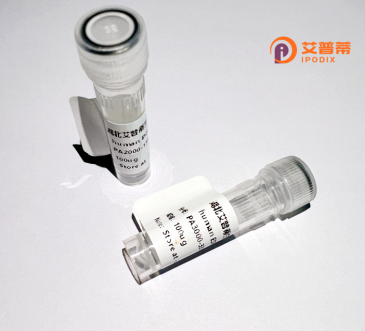
| 纯度 | >90%SDS-PAGE. |
| 种属 | Human |
| 靶点 | USP30 |
| Uniprot No | Q70CQ3 |
| 内毒素 | < 0.01EU/μg |
| 表达宿主 | E.coli |
| 表达区间 | 1-508 aa |
| 活性数据 | MTAADRAIQRFLRTGAAVRYKVMKNWGVIGGIAAALAAGIYVIWGPITERKKRRKGLVPGLVNLGNTCFMNSLLQGLSACPAFIRWLEEFTSQYSRDQKEPPSHQYLSLTLLHLLKALSCQEVTDDEVLDASCLLDVLRMYRWQISSFEEQDAHELFHVITSSLEDERDRQPRVTHLFDVHSLEQQSEITPKQITCRTRGSPHPTSNHWKSQHPFHGRLTSNMVCKHCEHQSPVRFDTFDSLSLSIPAATWGHPLTLDHCLHHFISSESVRDVVCDNCTKIEAKGTLNGEKVEHQRTTFVKQLKLGKLPQCLCIHLQRLSWSSHGTPLKRHEHVQFNEFLMMDIYKYHLLGHKPSQHNPKLNKNPGPTLELQDGPGAPTPVLNQPGAPKTQIFMNGACSPSLLPTLSAPMPFPLPVVPDYSSSTYLFRLMAVVVHHGDMHSGHFVTYRRSPPSARNPLSTSNQWLWVSDDTVRKASLQEVLSSSAYLLFYERVLSRMQHQSQECKSEE |
| 分子量 | 81.62 kDa |
| 蛋白标签 | GST-tag at N-terminal |
| 缓冲液 | PBS, pH7.4, containing 0.01% SKL, 1mM DTT, 5% Trehalose and Proclin300. |
| 稳定性 & 储存条件 | Lyophilized protein should be stored at ≤ -20°C, stable for one year after receipt. Reconstituted protein solution can be stored at 2-8°C for 2-7 days. Aliquots of reconstituted samples are stable at ≤ -20°C for 3 months. |
| 复溶 | Always centrifuge tubes before opening.Do not mix by vortex or pipetting. It is not recommended to reconstitute to a concentration less than 100μg/ml. Dissolve the lyophilized protein in distilled water. Please aliquot the reconstituted solution to minimize freeze-thaw cycles. |
以下是关于重组人USP30蛋白的3篇参考文献概要:
1. **文献名称**:*Structural basis for selective cleavage of Lys63-linked polyubiquitin chains by USP30*
**作者**:S. R. Gersch et al. (2020)
**摘要**:该研究解析了USP30结合K63型泛素链的晶体结构,揭示了其底物选择性的分子机制。利用重组表达的人源USP30蛋白,阐明了其通过特定结构域识别泛素链的结合模式,为设计靶向USP30的抑制剂提供了结构基础。
2. **文献名称**:*USP30 regulates mitophagy by deubiquitinating PINK1/parkin-targeted mitochondrial proteins*
**作者**:Y. Liang et al. (2018)
**摘要**:研究证实重组人USP30通过去泛素化线粒体蛋白(如TOMM20),负调控PINK1/parkin介导的线粒体自噬。在体外实验中,USP30酶活缺陷突变体显著增强线粒体清除,提示其作为帕金森病潜在治疗靶点。
3. **文献名称**:*Development of a high-throughput assay for USP30 inhibitors using recombinant enzyme*
**作者**:C. R. Rose et al. (2019)
**摘要**:文章报道了基于重组人USP30蛋白的高通量酶活检测平台的开发。通过优化荧光底物(Ub-AMC)的反应条件,筛选出多个选择性抑制剂,并验证其对线粒体自噬的调控作用,为药物发现提供工具。
4. **文献名称**:*USP30 deubiquitylates MFN2 and restricts mitochondrial fusion*
**作者**:T. Durcan et al. (2021)
**摘要**:该研究发现重组USP30通过去泛素化线粒体融合蛋白MFN2抑制线粒体融合。利用体外泛素化分析和细胞模型,证实USP30活性缺失导致MFN2泛素化增强,引发线粒体形态异常,揭示了USP30在动态平衡中的双重功能。
Ubiquitin-specific protease 30 (USP30) is a deubiquitinating enzyme belonging to the ubiquitin-specific protease family, which regulates protein degradation by removing ubiquitin tags from substrates. Predominantly localized to the outer mitochondrial membrane, USP30 plays a critical role in mitochondrial quality control and dynamics. It counteracts Parkin-mediated mitophagy, a selective autophagy process that removes damaged mitochondria, by cleaving ubiquitin chains attached to mitochondrial proteins. This function positions USP30 as a key modulator of cellular responses to mitochondrial stress and metabolic homeostasis.
Structurally, USP30 contains a transmembrane domain anchoring it to mitochondria and a catalytic domain responsible for its deubiquitinase activity. Dysregulation of USP30 has been implicated in neurodegenerative diseases, particularly Parkinson’s disease, due to its interaction with the PINK1/Parkin pathway. Overexpression of USP30 inhibits mitophagy, contributing to the accumulation of dysfunctional mitochondria, while its depletion enhances mitochondrial clearance.
Recombinant human USP30 protein is widely used in biochemical and cell-based studies to investigate mitochondrial biology, ubiquitin signaling, and therapeutic targeting. Its applications span drug discovery for conditions linked to mitochondrial dysfunction, including neurodegeneration, cancer, and metabolic disorders. Researchers utilize recombinant USP30 to screen inhibitors or study enzyme-substrate interactions, aiming to develop therapies that modulate mitophagy and cellular quality control pathways.
×